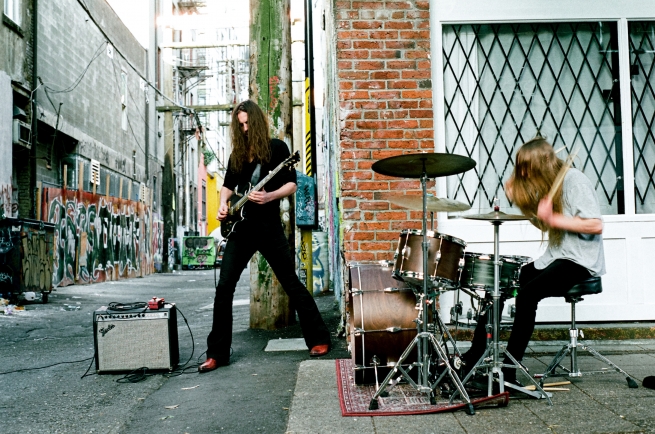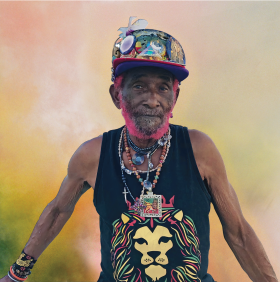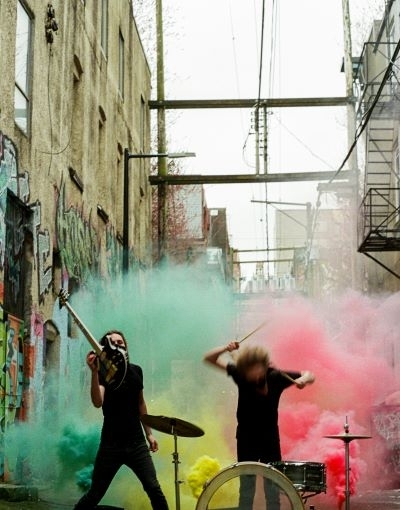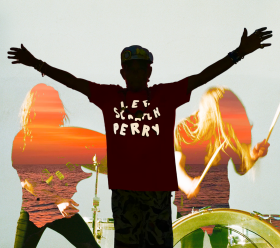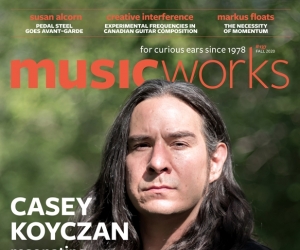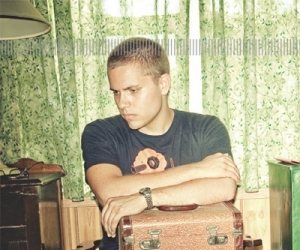Immediately after Perry agreed to collaborate, New Age Doom entered the same studio where I spoke with them and laid down the album’s mesmerizing foundation of guitar, bass, and drums in two short hours. This free-flowing jam was edited down to fifteen minutes, using various parts of the session, and sent to Perry. “Three days later we had his vocal tracks in our inbox,” said Valou. “It was totally surreal.”
Breitenbach and Valou then sent the music—now with Perry’s vocals in the mix of the sessions—to a diverse group of powerhouse players including jazz saxophonist Donny McCaslin and bassist Tim Lefebvre (both members of David Bowie’s Blackstar band), trumpeter Daniel Rosenboom, and drummer Dahm Majuri Cipolla of the Japanese post-rock group MONO. Rather than separating the session into individual songs, New Age Doom sent each contributor the full, unfinished, primary-duo album to use as a primed canvas.
“Every person received the same version of the album, so none of them had any idea of what they were working on,” explained Breitenbach. “Only we had that until the album was finished. As coproducers, Greg and I wanted to leave as much space as possible for people to have maximum creative expression.”
“We ended up with tons of synchronicities and accidental interplay,” added Valou. “That kind of spontaneity is really important to us. It’s easy to hear in a live performance, but when you can suggest it on a recorded work—that’s a sweet spot for me as a producer. I love to capture the warm thrill of confusion, like Roger Waters said.”
Throughout the album’s six expansive songs, New Age Doom and their cadre of collaborators reveal the vast possibilities of improvisation. Whether loping into the grooves of “Holy Dub” and “Life is an Experiment,” entering ominous territory with the pounding rhythms of “Step in Space,” or blazing into fire-music cacophony on the twelve-minute-long closer “Conquer The Sin,” their sound is more playful and funkier than what you might expect from the genre of doom metal. Shimmering with the dub effects of analog plate reverb and Roland Space Echo, as the horns alternate between regal and raging, Perry plays the role of preacher–toaster with his singular sense of humour—for example, tucking his own name into the spelling of “exPERRYment” in his handwritten text on the album’s back cover. Breitenbach told me that when the cover photo of Perry holding his cellphone was taken, he was calling his old friend Bootsy Collins to wish him happy birthday.
In addition to their international ties, the members of New Age Doom are connected to the Canadian indie-rock world. Breitenbach plays drums for the Vancouver band Limblifter, whose founding member Ryan Dahle was both a player and producer on Lee “Scratch” Perry’s Guide to the Universe. Another returning guest from the duo’s debut is keyboardist Greg Macdonald, who currently plays both with Limblifter and Halifax rock heroes Sloan.
Macdonald, who released his first solo album in 2020 under his instrumental alias Cola Wars, jumped at the opportunity to take part in a collaboration with limitless possibilities. “To be involved in a project that welcomes all ideas, where everything seems to survive all stages, was really exciting,” he explained during the same conversation I had with New Age Doom at their studio, where he was visiting to film a music video. “Initially, I sent Eric a bunch of recordings and would have been impressed if any of them made it to the final album. Just about everything did. We’ve all played with people who think there are ways that things should be done, but having this amount of trust and faith in each other was so thrilling.”
It’s tempting to compare Lee “Scratch” Perry’s Guide to the Universe to an album like David Bowie’s Blackstar, where its creator knew his days were numbered, but the similarities stop with the personnel involved. Perry’s passing came as a surprise to everyone around him. What can be assured is that New Age Doom has given his fans an invaluable gift with the final full-length statement from one of music’s most vital sound architects.
“You don’t have to put on Lee’s own albums to hear his influence,” said Macdonald. “We all love the Beastie Boys, and that’s how I first heard about him. Hello Nasty is the coolest album, because it features him [on the song ‘Dr. Lee, PhD’]. I certainly wasn’t listening to dub music when I was a young teenager because I wasn’t cool enough, but even musicians I did know loved him and looked up to him. Everyone owes him something.”
For Valou—who spends his time outside of New Age Doom playing Zimbabwean Afro-fusion, Arabic jazz-rock, and Balkan folk music with various groups—the chance to team up with Perry was life-changing. Breitenbach wholeheartedly agrees with his bandmate’s artistic philosophies, transcending hackneyed notions of cultural cross-pollination to achieve true moments of one-on-one connection and real-time inspiration.
“It’s important to play with people from different age groups, different parts of the world, different first languages, and different musical languages,” said Breitenbach. “We’re always expanding our creative horizons, and count ourselves lucky to have had this rarified experience of working with Scratch. The words of wisdom flow from his heart and soul on this album. He’s streaming his vision that ‘life is an experiment’ at every changing moment. We just gave him space, and genius happened.”
Three months after my interview with New Age Doom, I returned to their studio for an invitation-only performance celebrating the release of Lee “Scratch” Perry’s Guide to the Universe. Performing for a small but awestruck audience, the band’s core duo summoned mightier sounds than anyone would expect from two people. In between blasts from a smoke machine, Valou alternated between bowing and strumming a metallic hybrid instrument strung with guitar, bass, and harp strings. Breitenbach, locked into a strangely beautiful choreography with his musical partner, spun his arms and whipped his hair while pounding out rhythms on a pair of massive double bass drums. As prerecorded samples of Perry’s voice were triggered on an electronic pad, and images of his face appeared on a large screen next to the band, we all felt the presence of the late dub legend.
PHOTOS: Photos by Kaja Jean and Lady Nigel Buterfly
